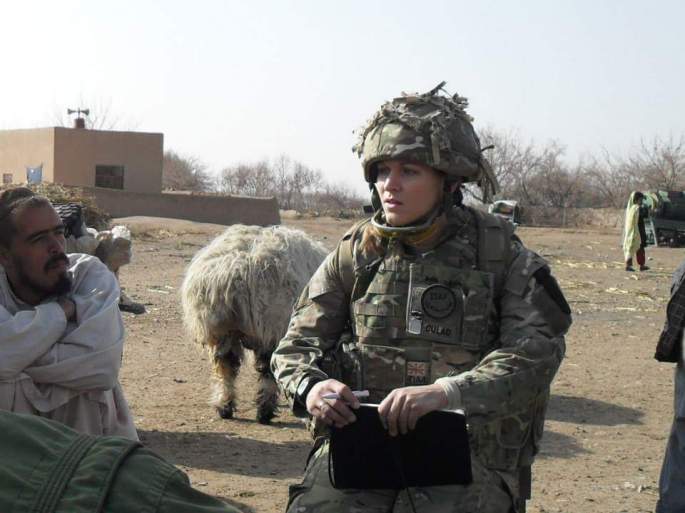The Founder:

Name- Rachael Phillips
Job- Generous Giving Project Officer
Home- Born and raised in Darlington. Studied at Teesside University and Durham University (so I’m a proper northerner).
Faith- Fairly new Christian. My conversion happened in Afghanistan.
Credentials- Before this job I spent 13 years serving in the British Army, as a Royal Engineers Officer, but most of my career was in non-engineering roles. In Afghanistan, Bosnia, Denmark, Austria and the UK, I was mostly employed in community support type roles (short video). I’m also a linguist… (start this video at 2mins 32 secs)
I love to chat, and luckily in the Army I got the chance to do lots of it. Talking with and listening to the ordinary people who lived near the military bases in which I’ve served, was part of my job. I’ve acted as a mediator, negotiator, sign poster, meetings organiser, project planner, bridge builder -metaphorically and literally- communications facilitator and even interpreter (I speak Pashto, Bosnian/ Croatian/ Serbian/ Montenegrin, French, German and Spanish).
 Faith-wise, it’s all rather new. I had no interest in or even belief in God when I became an adult, despite having been baptised and taken to Sunday School as a child. So it was a surprise to meet God in Afghanistan and to become a Christian there.
Faith-wise, it’s all rather new. I had no interest in or even belief in God when I became an adult, despite having been baptised and taken to Sunday School as a child. So it was a surprise to meet God in Afghanistan and to become a Christian there.
Even though for most of my adult life, I’d lived in religious communities abroad, and had been surrounded by faithful Muslims, living out their religion in all aspects of their daily routine, I was never inspired to question who God might be to me, until a completely out of the blue experience in a shipping container in Helmand Province, Afghanistan. That story is here. You can read what I’ve written about being new to faith, the church and trying to understand my calling on my personal blog here, but suffice to say, having my eyes opened to the wonder of God…well it was a bit of a shock!
My faith has grown daily since that experience, and later, on the night when I came to be confirmed, I felt I heard clearly that God was calling me to something specific. Since then I have been exploring if this might be Ordained Ministry. To try and work this out, I left my job in the Army and returned home to the North East to study theology at Cranmer Hall, Durham University, for a year, alongside people who are training to be ordained ministers. And then I got this job, which puts me right in at the deep end, exactly where I like to be!
I hope to bring all that I’ve experienced and learned to this role (making the most of my project management and people skills, but not really drawing too much from my combat skills!), to encourage and inspire my fellow Christians in the Diocese. I am learning more about the Church and God every single day and am very excited to be doing this whilst serving you, and You.
Rachael continues to serve the Diocese of Durham in a new capacity as Mission Support Partner
The Editor

Name- Reverend Tom Brazier
Job- Rector of Greenside Parish
Home- Speaks with a South African accent but is British by birth. Eats both biltong and corned beef hash.
Faith- Ordained Minister so lots of faith.
Credentials- Writing about anything related to Christian faith can be a real minefield because Christians hold so many different views. The author of these articles is still a fairly new Christian and mistakes can easily be made. [Ed: just the odd little one here and there – but my lips are sealed.] Rev. Tom Brazier was brought on board to check that the first article was theologically sound and heresy free and we haven’t been able to get rid of him since. [Ed: reword last phrase, please.] Tom was also part of the conception of the Generous Giving Project, which differs quite significantly from a traditional stewardship advisor’s role…
Being the editor gives Tom free reign [Ed: “free rein”] to be a huge grammar pedant [Ed: it’s not just grammar, I’m more of a jack-of-all-trades pedant], a character trait that is suppressed in ordinary pastoral life. Tom enjoys the challenge of receiving the unpolished musings of his protégé, and carefully deleting bits and suggesting amendments so as to craft them into palatable articles for the wider audience.
Tom is passionate about church giving because, he says, “giving is so closely linked to spiritual health and I love to see churches flourishing.” He also loves the idea of being part of something much bigger than ourselves and bigger than our local church.
Tom was ordained in 2012 after training at Cranmer Hall, and served his curacy at Holy Trinity Washington. Before Tom wore a dog collar he had a very different life. He grew up in South Africa, and after studying science at university, he worked as a software engineer developing training simulators to help train the cavalry to operate tanks. [Ed: which swords I now would like to see repurposed as ploughshares. We also developed simulators for gigantic mining vehicles.]
After marrying Julie, the pair decided to take a few years out and to do some travelling, before returning home and getting on with their lives, but this short trip to Europe turned into a much longer trip indeed. Tom got a series of jobs working in London for a failing dotcom company, a not-failing investment bank and a motion picture special effects company. Using his extensive analytical skills honed in the simulator development industry, Tom lived and worked in London for 9 years, worshipping at St Simon’s in Shepherd’s Bush before the calling to ordained ministry became one he couldn’t ignore. [Ed: good word “honed” – make a note to use it again somewhere.]
Whilst training in Durham, he fell in love with the North East and decided to stay, which is just as well, as otherwise the communities of Greenside Parish would be without their vicar and the Generous Giving Project would churn out all kinds of nonsense. [Ed: again, my lips are sealed.]
His personal blog is here.
Finances Resources Co-ordinator
A few of months ago, a great thing happened. Samantha Lee joined forces with the Generous Giving Project to make up 2/3 of this three person team (our third and final member will be introduced next). Samantha is the Finance Resources Co-ordinator, and we’ll start by finding out what that’s about.
Sam, in a nutshell, what’s your job? I’m here to support local churches and treasurers to better manage their finances. If a treasurer has a question or problem, they can contact me and we’ll work through a solution. If a new treasurer needs help, or a church is hoping to encourage someone inexperienced to take on that role, I can help make it really simple and clear. And I’m also supporting treasurers by rolling out the Parish Giving Scheme, which helps churches with their cash-flow and brings us into the 21st Century with how we manage our giving.
You seem to know a lot about treasurers. Is this a particular interest of yours? Well, I am one! I’ve been serving my local church in this diocese as a treasurer for 3 years so I know the job inside out. I know what a difference treasurers make to the church and honestly feel blessed to do it.
It sounds like you’ll be able to easily empathise with treasurers “at the coal face”. I know as well as any treasurer, that sometimes the reality of church administration and finance roles can be demanding. Everyone assumes you’re the expert and it’s not always the case! Plus I’m a local girl so I understand church-life in the North East.
What’s the best thing about being a church treasurer? I like the fact I’m part of an on-going story, dating back literally thousands of years. Our generation benefits from the generosity and commitment of previous generations in ‘keeping the faith’ in ensuring a Christian presence in our local communities. And I’m part of this generation taking the church forward. It’s something that we continue to give thanks for.
I’ve not known you long, but long enough to know you love a spreadsheet. Would you say admin is your thing? Yes! I actually think being good at administration is a God-given gift. I see it as my spiritual gift. It’s what I bring to the church. And that’s really important.
Administration is key within every church to turn God-given vision into reality.
Go on… Well in Acts 6, the early church leaders decided that practical help was needed so that the church could serve God properly. Seven people were appointed to focus on administration, whilst others focussed on other areas of ministry, like prayer and preaching. Good administration and handling the books is what enables visionary leaders’ big ideas to be put into practice.
So it’s part of stewardship? Absolutely. Not just so we have cash-flow, but also being efficient in our administration is key to ensuring our time is spent well too. We need to be good stewards of our time just as much as our money.
Have you always been into administration? Is this a theme in your work-life? I’d say so. Before I worked for Durham Diocese I was an internal auditor. I provided business consultancy services and assurance for a range of third sector (not-for-profit) organisations.
What did you like about being an auditor? As an auditor, you’re a fresh pair of eyes. You’ve got an independent view on things. I liked being able to spot efficiency savings when organisations were bogged down in the day to day. I could make a difference. I’m naturally resourceful and I like problem solving. Oh and I’m pretty hardworking. I get very focussed on the task in hand until it’s sorted.
Thanks, Sam. I’m delighted we’re working together, and you can make sense of all the statistics and spreadsheets and numbers that sit just beyond my comfort zone. You’re a massive asset to the team.
Parish Giving Champion
Nathan, you’re not from these parts are you? Can you share with our readers where you’re from and what drew you to the wonderful north? Are you sitting comfortably?! I was actually born in the South East, but then I spent the first three years of my life in India with my missionary parents. We returned to the UK in the mid-1980s and I spent my entire childhood and teenage years attending a vibrant Pentecostal Church on the outskirts of South East London.
Wow, you’ll have to tell us more about your missionary parents some time. So after school what did you do? I spent three years at Bible College, and graduated with a degree in Theology. After that my wife and I moved back to the South East and became Youth Pastors in our home church for three years until God led us to move north in 2006 to plant a church in Middlesborough.
Not your typical start to Christian life then. Planting a church must have been such an experience. It was, but after seven years of hard work leading that church we felt it was the right time to hand it over to another couple to lead, and we and moved even further north to Gateshead. Up there we play a key role in our local church, Hillsong Church, Newcastle.
So you’ve got lots of experience of the challenges of growing churches and working with local communities. Very handy. Have you ever worked outside the church? I have indeed. Before taking this job with Durham Diocese, I worked for the North East Autism Society in their new Employment Futures service. I was helping people on the autistic spectrum to find employment or meaningful work experience.
Do you think you’ll be able to use these experiences too? Absolutely. I see my role here as being largely defined by the needs of each Parish I have the opportunity to work with, so definitely using my listening skills and hands-on community work. I’ll be listening to their needs and goals and we’ll work on a plan together. It’ll be tailored support for each church. For some it may be that my input at a PCC level that’s required. Others may need assistance with planning a medium-term Stewardship campaign. I’ve also done a lot of public speaking so I’d like to use these skills too.
What are you most looking forward to in your role as Parish Giving Champion? Well there’s one thing I’m really passionate about, and that’s helping people to have financial freedom. I want to help churches to provide avenues to financial freedom and for individuals to be released from debt. I want churches to not just focus on what they get on the Offering Plate, but to look beyond at the things that may be holding people back. Personal debt is a big problem and I think the church can really help with that. I’d like to support more of our churches in hosting courses on financial freedom.
It sounds like you’ll be out and about a lot. I hope so! I am not a big fan of office-based work so I’m keen to get around and help as many Parishes as possible in a focussed and intentional way. A big part of how I will measure my own success will be based on how much time I’m not at Cuthbert House!
If you’d like to contact Nathan and find out about the interesting and diverse ways he could support your church please email him at nathan.bruce@durham.anglican.org






 Faith-wise, it’s all rather new. I had no interest in or even belief in God when I became an adult, despite having been baptised and taken to Sunday School as a child. So it was a surprise to meet God in Afghanistan and to become a Christian there.
Faith-wise, it’s all rather new. I had no interest in or even belief in God when I became an adult, despite having been baptised and taken to Sunday School as a child. So it was a surprise to meet God in Afghanistan and to become a Christian there.








